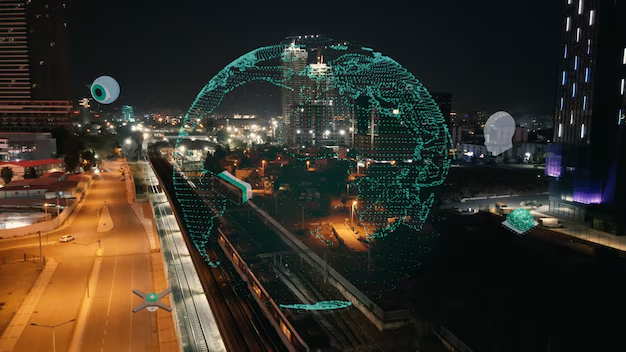Technology has revolutionized every aspect of human life, from the way we communicate to how we work, learn, and even think. In the past few decades, technological advancements have pushed the boundaries of what’s possible, creating new industries, disrupting traditional ones, and giving rise to solutions that were once thought to be the stuff of science fiction. But this is just the beginning. As we look toward the future, the pace of innovation is accelerating, and technology is set to transform our world in ways we can’t yet fully comprehend.
In this article, we will explore how technology is shaping the future, the potential it holds, and how it can address some of the world’s most pressing challenges.
The Driving Forces Behind Technological Innovation
Several factors are propelling technological advancements, including:
- Artificial Intelligence (AI) and Machine Learning: AI is no longer just a concept from sci-fi movies; it is a transformative technology that is already changing industries. From healthcare, where AI helps diagnose diseases, to autonomous vehicles, AI is driving innovations that enhance efficiency, accuracy, and safety. Machine learning, a subset of AI, allows systems to learn from data and improve their performance over time, enabling smarter decision-making.
- Big Data and Analytics: We generate more data than ever before, and the ability to harness and analyze this data is revolutionizing industries. By collecting vast amounts of information from various sources, businesses can uncover patterns, make predictions, and optimize processes. This data-driven decision-making is helping companies improve products, enhance customer experiences, and reduce operational costs.
- The Internet of Things (IoT): IoT refers to the network of interconnected devices that communicate with each other over the internet. From smart home devices like thermostats and lights to industrial sensors that monitor equipment, IoT has the potential to make our lives more efficient and our world more connected. IoT technologies are being used in everything from healthcare to agriculture, creating new possibilities for automation and optimization.
- Blockchain Technology: Blockchain is most commonly associated with cryptocurrency, but its potential extends far beyond that. Blockchain provides a decentralized, transparent, and secure way to record transactions and data. This technology has applications in sectors like finance, supply chain management, and even voting systems, where trust and transparency are critical.
- Robotics and Automation: Robotics is transforming industries by automating repetitive tasks, improving efficiency, and reducing costs. From manufacturing plants to healthcare facilities, robots are taking on roles that were once performed by humans. This has led to more productive work environments and the ability to perform tasks with greater precision and speed.
The Future of Innovation: Key Areas of Transformation
As technology continues to evolve, there are several key areas where innovation is expected to make the biggest impact:
- Healthcare: The healthcare sector is poised to undergo a massive transformation due to technology. Advances in AI and machine learning are enabling more accurate diagnoses, better treatment plans, and personalized medicine. Robotics is already helping with surgeries and patient care, while telemedicine is making healthcare more accessible to people in remote areas. The future of healthcare holds great promise in improving both the quality and accessibility of care worldwide.
- Sustainability and Clean Energy: As the global community faces the challenge of climate change, technology is playing a vital role in finding sustainable solutions. Renewable energy sources like solar, wind, and geothermal are becoming more efficient and cost-effective. Innovations in battery storage are making it easier to store renewable energy for use during non-peak hours. Additionally, smart grids and energy-efficient technologies are helping optimize energy consumption, reducing waste and promoting sustainability.
- Smart Cities: Urban areas are becoming increasingly populated, and managing these densely populated spaces is a significant challenge. Smart city technologies use IoT devices and sensors to improve infrastructure, manage traffic, reduce pollution, and enhance the quality of life for citizens. From smart streetlights to automated waste management systems, smart cities are an example of how technology can help create more efficient and livable urban environments.
- Education: Technology is revolutionizing the way we learn. Online education platforms and virtual classrooms are making education more accessible to people around the world. Augmented reality (AR) and virtual reality (VR) are creating immersive learning experiences that allow students to explore subjects in a more hands-on and interactive way. AI-powered tutoring and personalized learning tools are helping students learn at their own pace and according to their individual needs.
- Transportation: The future of transportation is being shaped by autonomous vehicles, electric cars, and high-speed trains. Self-driving cars have the potential to reduce accidents, traffic congestion, and improve fuel efficiency. Electric vehicles (EVs) are providing a cleaner, greener alternative to traditional gasoline-powered cars, contributing to the reduction of carbon emissions. Innovations like Hyperloop, a high-speed transportation system, could revolutionize long-distance travel, making it faster and more energy-efficient.
7 FAQs About Technology’s Impact on Innovation
1. How will AI change the workforce?
AI is expected to automate routine tasks, improving efficiency and freeing up humans for more creative, strategic roles. While some jobs may be replaced, new job opportunities in AI, data analysis, and technology development will emerge.
2. What is the role of big data in shaping industries?
Big data allows businesses to make informed decisions by analyzing vast amounts of information. It can improve customer experiences, optimize supply chains, and help companies understand market trends more effectively.
3. How can technology help address climate change?
Technology plays a critical role in combating climate change through clean energy innovations, such as solar power, wind energy, and energy storage. Smart grid technology and sustainable farming practices are also contributing to reducing environmental impact.
4. How is technology improving healthcare?
Technology is improving healthcare through AI-powered diagnostics, robotic surgeries, and telemedicine. These innovations help doctors make faster and more accurate diagnoses while expanding access to care in underserved areas.
5. What is blockchain, and how can it transform industries?
Blockchain is a decentralized and secure ledger system that can improve transparency, reduce fraud, and streamline processes. It has applications in finance, supply chain management, healthcare, and more.
6. What is a smart city, and how does it work?
A smart city uses IoT devices and sensors to improve infrastructure and services, such as traffic management, waste collection, and energy consumption. This technology aims to make urban living more sustainable and efficient.
7. How is transportation evolving with technology?
Transportation is evolving with autonomous vehicles, electric cars, and high-speed transportation systems like Hyperloop. These innovations are designed to reduce carbon emissions, improve safety, and make travel more efficient.
Conclusion
Technology is not just shaping the future; it is actively creating a world where the possibilities are endless. As AI, big data, robotics, blockchain, and other technologies continue to advance, we are likely to see unprecedented innovations that will solve global challenges, transform industries, and improve the quality of life for people worldwide. The future of innovation is a promising one, and those who embrace and adapt to these technological advancements will be at the forefront of shaping a better world.
Key Takeaways
- Technology is transforming industries, from healthcare and education to transportation and sustainability.
- Innovations like AI, big data, IoT, and blockchain are driving the future of innovation.
- Technology holds the potential to address global challenges, such as climate change, while improving the quality of life for individuals worldwide.
- Embracing technological advancements and adapting to new ways of working will be key to shaping a prosperous and sustainable future.

